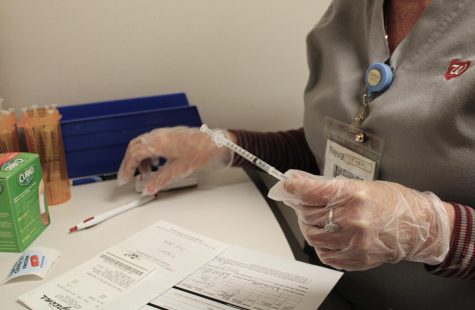Graduate exams amidst COVID-19 provides new challenges to students
October 21, 2020
In the wake of COVID-19 and the need for social distancing, many graduate exams began offering students an at-home option.
All graduate exams except for the LSAT offer the test digitally at a testing center still, but the testing centers are now only open at limited capacity, and there are fewer available than before.
Stephen Harris is the director of the curriculum development for an educational testing consultant’s company WKU hired to provide test prep. He said the graduate test most affected by this switch is the LSAT.
LSAC, the creators of the LSAT, temporarily replaced the LSAT with the LSAT flex. This version of the test is only offered at-home and consists of only three sections, versus the previous five. The writing section and one of the logical reasoning sections have been removed.
Harris said that this may indicate to students that the logical reasoning section, which used to take up two sections but now only one, weighs less heavily than before, but Harris warned against this.
“The LSAC folks claim scores are commensurate, which strongly suggests that they weigh the single logical reasoning section more heavily,” Harris said. “I would just warn test takers not to think they can get off easily on logical reasoning because they only have one section.”
Josie Stallons, a senior from Cadiz, Kentucky studying Criminology and Legal Studies, took the LSAT flex in June, and she said she focused more on the logical reasoning section for the same reason Harris said to.
“The shift from five sections to three was nice but also stressful because it put so much pressure on each section.” Stallons said. “I put more focus on the logical reasoning section because I figured the one section counts for more now so I had to get more of them right.”
Harris said the new requirements for at-home digitally delivered tests could potentially create another barrier for already disadvantaged students.
Since the new administration of the LSAT is only offered at-home, a desktop and sufficient internet access is required to take the test. The LSAC website says they will work with candidates who do not have the necessary technology to try to provide loaner devices so they can meet the technological requirements.
Casey Lyle, a senior at WKU studying political science and paralegal studies, took the LSAT flex in August and said that she went home to take the test for better internet connection and a quieter environment.
“I went home to take the LSAT flex but if I didn’t have that option, I would’ve had to worry about the internet and distractions,” Lyle said. “So, I’m lucky to have had that option because it was already stressful enough without that added factor.”
Lyle said that despite some new anxieties about the new format, she would take the LSAT flex version again over the alternative.
“I think I would’ve done worse in person because I get so anxious about other people around me,” Lyle said. “I think they’re overperforming me, or I get distracted by a pen clicking or a foot tapping, but because my mom and dad just went outside while I took it and I was by myself, I focused better.”
Harris said digital formats of all graduate tests can present challenges for certain students who do not have much experience with an online format of testing.
“I think the test makers would probably say that since the tests are graded on a curve, you’re being compared to your peers who are facing the same challenges that you are so it should all be a wash,” Harris said. “But the effects of the move to the digital format aren’t going to be equal depending on your experience with digital formats so undoubtedly there will be some students who will be negatively affected relative to their peers”
Harris said that one of the good things though is that the test makers give the opportunity to practice with online tests for free, so to counteract the struggles some test takers might have with online formats, he suggests preparing as much as possible.
“Prepare, prepare, prepare. Make sure you are as familiar as possible with the online format of the test so you know how to find what you’re looking for when scrolling down a page,” Harris said. “Plan ahead for your test date, try to find a distraction free environment to take the test in, whether that be the library or a secret room in your house, and practice with online practice tests.”
If students have diagnosable learning disabilities they need accommodations for, the at-home and digital tests still offer testing accommodations, as listed on their respective websites.
Both Stallons and Lyle said they focused on taking online practice tests to get familiar with the user interface because while each section is the same, it feels different taking the test online than with the paper and pencil version.
“You still have the same amount of time but it feels like it goes by faster when you’re doing it online,” Lyle said. “No matter which test you’re taking, get familiar with the online format so you can know how to highlight or underline, and prepare for longer reading passages than you would expect to see.”
Another concern with at-home testing is security and whether anti-cheating mechanisms are possible. The at-home versions of graduate exams are all proctored online through ProctorU. With this, the proctor is able to see the test-taker and chat with them through a chat box, but the test taker cannot see the proctor.
Stallons said this feature of the test definitely created extra stress for her.
“I couldn’t see the proctor’s face and I was so worried what if I look into space at the top right corner and they flag my test. I was worrying about that the entire exam” said Stallons.
Lyle also said this created an added element of anxiety.
“The proctor could see me but I couldn’t see them, they could’ve had me on camera the whole time or just popped in briefly.” Lyle said. “If it were in a testing center, that aspect wouldn’t have felt as stressful because they aren’t just focused on you and analyzing your every move.”
While there were some added stress factors, both Lyle and Stallons agreed that they liked taking the test in a familiar environment and they would do it in that format again if given the choice.
Harris said he believes there are many positive features of the change to the digital format and the at-home version of these tests, but he said that he and most involved with test preparation still have on big concern.
“If you’re at all involved in standardized test preparation, your number one concern is how does this affect underrepresented students who are already on an uneven playing field,” Harris said. “Obviously, the thing that correlates most strongly with test scores is family income so that’s my major concern.”
Maggie Thornton can be reached at [email protected].



















